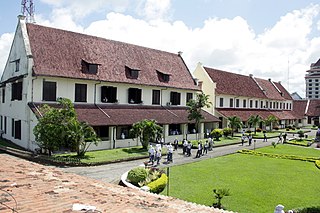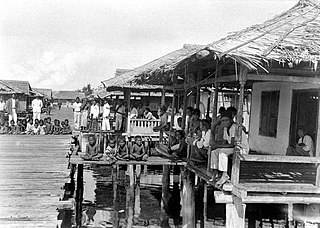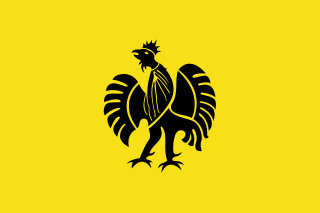
Makassar, formerly Ujung Pandang, is the capital of the Indonesian province of South Sulawesi. It is the largest city in the region of Eastern Indonesia and the country's fifth-largest urban center after Jakarta, Surabaya, Medan, and Bandung. The city is located on the southwest coast of the island of Sulawesi, facing the Makassar Strait.

The Bajo, Bajonese, Bajonesian, or Wajo, Wajonese are the indigenous Indonesian ethnic group native to the Bajo Island of Lesser Sunda Islands in Indonesia. These ethnic group can be found all across the Flores Sea to the northeastern Bali Sea, and some have established permanent settlements in the southern of Sulawesi where they are locally known as the Wajo Bugis due to their close historical relation with the Bugis ethnic group.

TVRI, legally Lembaga Penyiaran Publik (LPP) Televisi Republik Indonesia is an Indonesian national public television network. Established on 24 August 1962, it is the oldest television network in the country. Its national headquarters is in Gelora, Central Jakarta.

Radio Republik Indonesia, legally Lembaga Penyiaran Publik (LPP) Radio Republik Indonesia, is a public radio network of Indonesia. Founded on 11 September 1945, it is the first radio network in Indonesia and the second oldest media company in the country after Antara. RRI headquarters are located on Medan Merdeka Barat Street in Central Jakarta, Jakarta.
Moronene is an Austronesian language spoken in Bombana Regency, Southeast Sulawesi, Indonesia. It belongs to the Bungku–Tolaki branch of the Celebic subgroup.
The Roman Catholic Archdiocese of Makassar is an archdiocese located in the city of Makassar in South Sulawesi in Indonesia.

Television in Indonesia started in 1962, when the then state-run station TVRI began broadcasting – the third country in Southeast Asia to do so. TVRI held a television monopoly in Indonesia until 1989 when the first commercial station, RCTI began as a local station and was subsequently granted a national license a year later. The Indonesian television is regulated by both Ministry of Communications and Informatics (Kemenkominfo) for frequency matters and Indonesian Broadcasting Commission (KPI) for content matters.

Fort Rotterdam is a 17th-century fort in Makassar on the island of Sulawesi in Indonesia. It is a Dutch fort built on top of an existing fort of the Gowa Kingdom. The first fort on the site was constructed by the a local sultan in around 1634, to counter Dutch encroachments. The site was ceded to the Dutch under the Treaty of Bongaya, and they completely rebuilt it between 1673 and 1679. It had six bastions and was surrounded by a seven meter high rampart and a two meter deep moat.

Digital terrestrial television in Indonesia (DVB-T2) started in 2009, and in most areas runs alongside the analogue TV system. The first phase of nationwide analog shutdown was done in 166 regencies and cities, including Dumai, Banda Aceh, Batam, Tanjungpinang, Serang, Bali, Samarinda, Tanjung Selor, Tarakan, Makassar and Jayapura, starting on 30 April 2022 and it simplified in three stages. An analog broadcasting station in Jakarta along with 173 regencies/cities non-terrestrial services was officially signed off on 2 November 2022 at midnight. Batam, Bandung, Semarang, Surakarta and Yogyakarta followed on 2 December 2022, Surabaya on 20 December 2022, Banjarmasin on 20 March 2023, Bali and Palembang on 31 March 2023, Makassar on 20 June 2023 and Medan on 30 July 2023. On 15 July 2023, at midnight, Trans Media and Emtek/SCM officially completed the shutdown. On 31 July 2023, at midnight, Viva Group, RTV, and NET TV officially completed the shutdown of analog broadcast nationwide, followed by MNC Group on 1 August 2023 at midnight. On 12 August 2023, the digital terrestrial television of Indonesia fully turned, shifted and switched to all high definition on all thirteen local free-to-air terrestrial television station.
State University of Makassar is a public university in Makassar, South Sulawesi, Indonesia. It was established on 1 August 1961. Its rector is Husain Syam.
Rineke Antoinette Hassim, best known by her stage name Rina Hasyim, is an Indonesian actress and model who has won both a Citra Award for Best Leading Actress and Citra Award for Best Supporting Actress.

KMP Tampomas II was a roll on-roll off car and passenger ferry owned by the Indonesian shipping company Pelni that burned and sank in the Java Sea while sailing from Jakarta to Ujung Pandang, South Sulawesi on 27 January 1981. This disaster resulted in the deaths of hundreds of passengers.

The Sultanate of Gowa was one of the great kingdoms in the history of Indonesia and the most successful kingdom in the South Sulawesi region. People of this kingdom come from the Makassar tribe who lived in the south end and the west coast of southern Sulawesi.

Fort Somba Opu was a fortified commercial center of the Gowa Sultanate. Its ruins are located in Makassar, South Sulawesi, Indonesia. The fort was the center of the Gowa Sultanate in the 16th-century until its destruction by the Dutch East India Company in 1669. The conquest of Somba Opu citadel was one of the most difficult campaigns the Company had ever undertaken in the East.
TVRI World is an Indonesian television channel owned by public broadcaster TVRI, catered for domestic and international audience. The English-language channel is currently on its trial broadcast, with its planned launching in 2024. The channel is domestically available in digital terrestrial, satellite, and TVRI Klik streaming service.

TVRI Jakarta is a regional public television station in Indonesia owned by TVRI. It serves the Special Capital Region of Jakarta, Indonesia and surrounding areas. TVRI Jakarta studios are located in Jalan Gerbang Pemuda, Central Jakarta, at TVRI national headquarters.

TVRI Sumatera Utara is a regional public television station owned-and-operated by TVRI, serving North Sumatra, Indonesia. TVRI Sumatera Utara studios are located in Medan, and its main transmitter is located in Bandar Baru, Sibolangit, Deli Serdang.
Public broadcasting institutions in Indonesia currently consists of three separate entities: Radio Republik Indonesia (RRI), Televisi Republik Indonesia (TVRI), and local public broadcasting institutions. The classification is based on Act No. 32 of 2002 on Broadcasting and followed by Government Regulation No. 11 of 2005 on Broadcasting Provision of Public Broadcasting Institution.

TVRI, formerly known as TVRI Jakarta Central Station is the main national public television channel owned by LPP Televisi Republik Indonesia (TVRI). The channel began broadcasting on 24 August 1962, making it the first television station in Indonesia. The channel was also the only television channel choice in Indonesia until 1989, when Programa Dua TVRI in Jakarta broadcast separately from TVRI and private television stations began broadcasting.














